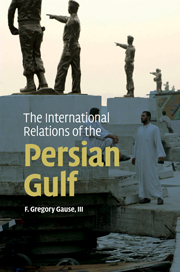Book contents
- Frontmatter
- Contents
- List of maps and tables
- Acknowledgments
- Note on the text and bibliography
- 1 The Persian Gulf as a security region
- 2 The emergence of the Gulf regional system, 1971–1978
- 3 The Iranian Revolution and the Iran–Iraq War
- 4 The Gulf War and the 1990s
- 5 9/11, the Iraq War and the future of the Persian Gulf
- 6 The Iraq War: American decision-making
- 7 Conclusions: war and alliance in the Persian Gulf
- Index
- References
6 - The Iraq War: American decision-making
Published online by Cambridge University Press: 05 June 2014
- Frontmatter
- Contents
- List of maps and tables
- Acknowledgments
- Note on the text and bibliography
- 1 The Persian Gulf as a security region
- 2 The emergence of the Gulf regional system, 1971–1978
- 3 The Iranian Revolution and the Iran–Iraq War
- 4 The Gulf War and the 1990s
- 5 9/11, the Iraq War and the future of the Persian Gulf
- 6 The Iraq War: American decision-making
- 7 Conclusions: war and alliance in the Persian Gulf
- Index
- References
Summary
The story of the American decision to go to war against Iraq in March 2003 is straightforward. The attacks on the United States of September 11, 2001, changed the strategic outlook of President George W. Bush. He accepted the calls from some in his administration, for which he had previously shown no particular enthusiasm, that a military campaign to unseat Iraqi president Saddam Hussein was a vital American security interest in the context of the new “war on terrorism.” Once that decision was made, arguments were marshaled (with less than rigorous regard for their factual accuracy and unseemly willingness to disregard the complexity and ambiguity of the Iraqi reality) to mobilize international, domestic public and congressional opinion in support of the decision. The international element of that campaign largely failed, while the domestic element was very successful. With the strong support of Congress and substantial American public opinion support, but with little preparation for what would come after, President Bush took the country to war.
So why rehearse the story in any more detail? Because there is a strong suspicion that September 11 was simply a pretext for the Bush administration to implement a preexisting war policy toward Iraq. This is certainly the import of accounts offered by former Treasury secretary Paul O'Neill, former counterterrorism director Richard Clarke, and retired general Wesley Clark.
- Type
- Chapter
- Information
- The International Relations of the Persian Gulf , pp. 184 - 240Publisher: Cambridge University PressPrint publication year: 2009

